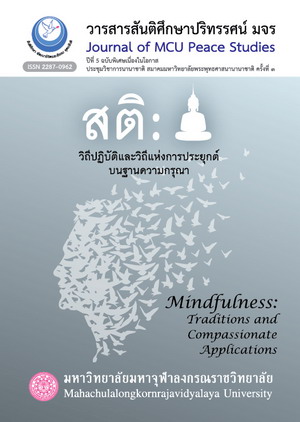A Comparative Study of The Pattern of Buddhist Mediation and JaoKotra system
Main Article Content
บทคัดย่อ
This thesis, a qualitative research done by the tools of documentation and an in-depth interview, is of 3 objectives: (1) to study the model of mediation in Buddhist Scripture, (2) to study the model of mediation of local mediators’ system (Jao-kotara’s), and (3) to analytically and comparatively study the model of Buddhist Mediation and the model of Local Mediators’ system (Jao-kotara’s).
From the research, it is found the followings:
1) Mediation is a process of conflict resolution by mediatorsto harmonize litigants to discuss for managing conflicts; in view of this, the mediators need to apply loving-kindness, politeness, not taking side and being honest.The Buddha’s means of mediation was in 3 dimensions: dealt face-to-face with litigants, negotiated and convinced litigants, and let go and left the matters for litigants to cooperate.
2) The local mediators’ system (Jao-kotara’s) is a system to manage conflicts in the community by families’ seniors as mediators in finding causes of problems and mutual resolution. The process of Local Mediators’ system (Jao-kotara’s) will resolve the conflicts by direct discussing or sometimes reflecting the system through traditions, ceremonies, and belief; for instance, a part of the success of Local Mediators’ system (Jao-kotara’s) is from giving respect to senior system, being senior relatives of each party and being honest and justice; the appeared outcome leads to the conflict settle, and good relationship towards each other is recovered with no reason to bring to the lawsuit.
3) Comparing Buddhist means of mediation to the local mediators’ system (Jao-kotara’s), it is in the same line of the objective of decreasing sufferings and creating happiness to the litigants in the following aspects: the mediators must listen or find out for the surrounding information, try to point out both advantages and disadvantages, usefulness and un-usefulness of the litigants’ conflicts, and mutually cooperate to find the best acceptable solution to every party. However, the mediators must be in the middle by not taking any side, have voluntary effort mind in helping or resolving the existing conflicts, and persuade with gentle words; in a nut shell, the mediators must hold on to the application of loving-kindness, compassion, altruistic joy and equanimity, etc. From the stated result of related Buddhist means of mediation and the local mediators’ system (Jao-kotara’s), it reflects the social enhancement for: love and unity among the people of the society, the less of quarrels or not destroying one another. Hence, the local system (Jao-kotara system) is a process of justice restoration, and it is a survival way of the present society.
Article Details
ทัศนะและความคิดเห็นที่ปรากฏในบทความในวารสาร ถือเป็นความรับผิดชอบของผู้เขียนบทความนั้น และไม่ถือเป็นทัศนะและความรับผิดชอบของกองบรรณาธิการ ยินยอมว่าบทความเป็นลิขสิทธิ์ของวารสาร


